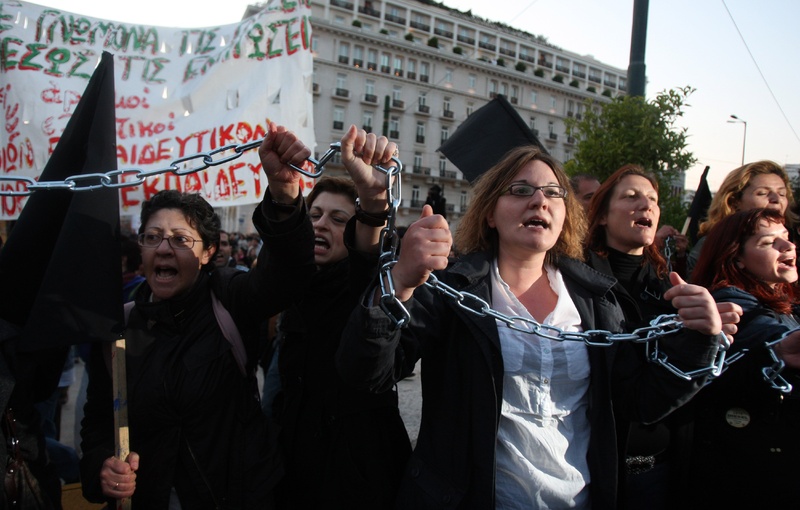ATHENS – Greece was pushed to the brink of a financial abyss and started dragging another eurozone country — Portugal — down with it Tuesday, fueling fears of a continent-wide debt meltdown.
Stocks around the world tanked when ratings agency Standard & Poor’s downgraded Greek bonds to junk status and downgraded Portuguese bonds two notches, showing investors that Greece’s financial contagion is spreading.
Major European exchanges fell more than 2.5 percent, and on Wall Street, the Dow Jones industrial average finished down more than 200 points. The euro slid more than 1 percent to nearly an eight-month low.
“We have the makings of a market crisis here,” said Neil Mackinnon, global macro strategist at VTB Capital.
Greece is struggling with massive debt, and with prospects for economic growth weak it could end up in default. Its 15 eurozone partners and the International Monetary Fund have tried to calm the markets with a euro45 billion rescue package, but it hasn’t worked.
Standard & Poor’s warned that holders of Greek debt could take large losses in any restructuring, but a greater worry is that Greece’s debt crisis is mushrooming to other debt-laden members of the eurozone.
One bailout can be dealt with, but two will be stretching it, and there are fears that other weak economies could be pulled down in the Greek spiral — including Europe’s fifth-largest, Spain. Can Germany, Europe’s effective paymaster, continue to bail out the weaker members of the eurozone?
The crisis threatens to undermine the euro and make it harder and more expensive for all eurozone governments to borrow money. It also has disrupted cooperation between eurozone governments, with Germany resisting the idea of bailing out Greece unless strict conditions are met.
Many investors think Greece will have enough money to avoid default in the coming weeks, but the future is cloudier.
Both Standard & Poor’s and the Greek finance ministry insisted that the country will have enough money to make the euro8.5 billion bond payments due on May 19. Even if it does, Greece faces years of austerity with living standards sharply reduced. Standard & Poor’s warned that the Greek economy was unlikely to be as big as it was in 2008 for another decade.
Junk status sinks Greece’s hopes even deeper. Losing investment-grade status for its bonds means Greece will have to pay higher costs to borrow if it taps debt markets again, and increases the chances that existing debt will have to be restructured.
“The latest developments mean that the chances of Greece solving this situation without restructuring its debts are now dim,” said Diego Iscaro, senior economist at IHS Global Insight.
The FTSE 100 index of leading British shares closed down 2.6 percent, Germany’s DAX slid 2.7 percent and the French CAC-40 in France ended 3.8 percent lower.
Greek and Portuguese stocks were pounded — down 6.7 percent and 5.4 percent, respectively — while their market borrowing costs went through the roof. The interest rate for Greek two-year bonds jumped to 18 percent.
Both governments responded with alarm at the downgrades.
“This decision will not help markets to calm down, but will, on the contrary, contribute to their turbulence,” said Portuguese Finance Minister Fernando Teixeira dos Santos.
Greek Finance Minister George Papaconstantinou said the downgrade “does not reflect the real state of our economy, nor the fiscal situation, nor the ongoing negotiations which have the very realistic propects that they will be completed successfully in the next few days.”
The crisis has highlighted the eurozone’s inability to keep governments from undermining the euro by running up big debts.
Send questions/comments to the editors.



Success. Please wait for the page to reload. If the page does not reload within 5 seconds, please refresh the page.
Enter your email and password to access comments.
Hi, to comment on stories you must . This profile is in addition to your subscription and website login.
Already have a commenting profile? .
Invalid username/password.
Please check your email to confirm and complete your registration.
Only subscribers are eligible to post comments. Please subscribe or login first for digital access. Here’s why.
Use the form below to reset your password. When you've submitted your account email, we will send an email with a reset code.